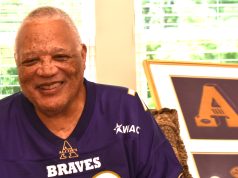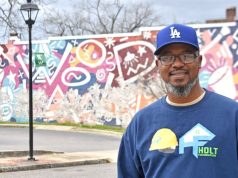 More than 300 people turned out in Greene County Saturday, Oct. 12, for the dedication of the county courthouse square named in honor of Rev. Thomas Earl Gilmore, the county’s first Black sheriff and now Pastor of First Baptist Church Ensley for 30 years.
More than 300 people turned out in Greene County Saturday, Oct. 12, for the dedication of the county courthouse square named in honor of Rev. Thomas Earl Gilmore, the county’s first Black sheriff and now Pastor of First Baptist Church Ensley for 30 years.
The historic event included proclamations and presentations by some of the state’s well-known political officials and dignitaries from the state’s Civil Rights Movement.
“Rev. Thomas E. Gilmore is the greatest because he is a servant of all,” said retired federal District Court Judge U.W. Clemon. “He has done great things for Greene County and Jefferson County.”
Clemon also read a portion of a letter from former Alabama Attorney General Bill Baxley which said, “Sheriff Gilmore is one of the most able public servants I have known, and we were warriors together for justice in Alabama.”
Gilmore was the first Black sheriff elected in Greene County, and the second only Black sheriff elected in the state by 1971. He was famously known as the “sheriff who did not carry a gun” mainly because of his Christian influence as a minister and Dr. Martin Luther King’s philosophy of non-violence. He was portrayed by Lou Gossett Jr. in the 1979 movie This Man Stands Alone.
Born in Forkland, Alabama, in 1941, Gilmore attended local public Greene County schools before enrolling in Selma University in 1959. He later married his childhood sweetheart Miss Minnie Gilbert, and the couple moved to Los Angeles, California, a short time later – just months before the bombing of 16th Street Baptist Church in 1963. Gilmore, his wife and three young sons returned to Greene County in 1965 and found themselves in the midst of growing racial turbulence.
Just a few weeks after returning to Greene County, Gilmore travelled to neighboring Demopolis one evening to purchase milk for his young son. As he pulled into a gas station, he unknowingly drove across a puddle of water, slightly splashing a white state trooper and his patrol car. The angry officer exited his patrol car and pushed Gilmore against the gasoline pump. He also frisked Gilmore and demanded that he wash his patrol car. A fellow state patrol officer intervened and threatened Gilmore’s life because the officer thought Gilmore was an active Civil Rights worker because he had a beard, was wearing overalls and driving an automobile with California license plates. That moment left a lasting impact on the young clergyman and set his mind on staying in the Greene County area to do something about police brutality.
Gilmore immediately became active in the local Civil Rights Movement and the meetings held at Ebernezer Baptist Church in Forkland, Ala., where Rev. William McKinley Branch was pastor. Rev. Branch was instrumental in recruiting Gilmore to take part in the local Civil Rights Movement. Later Rev. James Orange, a veteran of the Birmingham Civil Rights Movement recruited Gilmore to become a paid staff member of Dr. Martin Luther King Jr.’s Southern Christian Leadership Conference. At Dr. King’s behest, Branch, Gilmore and others led local voter registration drives.
Months later, Gilmore helped lead a demonstration after a young Black woman was assaulted by a local deputy sheriff. While trying to file a complaint with the local district attorney, Gilmore and others were beaten by the Greene County Sheriff in the district attorney’s office.
Shortly afterward, Rev. Branch and Rev. Orange courageously put forth the idea that Gilmore should seek the office of sheriff, and Rev. Branch spoke at many of the mass meetings about the idea from then until Gilmore was elected fours year later.
“He (Rev. Branch) was the general of our movement, and to help end police brutality here in Greene County, it was his idea that I was to run for sheriff.”
At the age of 24, Gilmore ran for his first public office, but voter irregularities caused his election defeat in 1966. He ran again four years later in answer to the countless cases of police brutality across the Black Belt and won.
“I am the man I am today because I had a good family,” Gilmore told the crowd gathered in front of the original Green County Courthouse on Saturday. “But I also had a good civil rights family,” he continued, referring to Rev. Branch.
Several state officials took the time Saturday to recognize Gilmore for his courageous effort and work leading the Green County Sheriff’s Department and County Jail for three terms.
State Senator Bobby Singleton presented a proclamation from the Alabama Legislature recognizing Gilmore for “his outstanding achievement and public service.”
Charles Steele, president emeritus of the Southern Christian Leadership Conference and first Black member of the Tuscaloosa City Council, said as a young man Gilmore inspired him to dream big dreams and accomplish large goals. “He always said as long as we talk, we can make things happen. Whoever thought this little country boy would go all over the world? I too have since traveled all over the world and there are opportunities that I didn’t realize that I could achieve until I met Rev. Gilmore. ”
Ms. Hattie Edwards, the mayor of Eutaw, Ala., presented Gilmore with a key to the city and called him a trailblazer and a visionary. “I am standing on his back so that someone like me could be the mayor of Eutaw,” she said.
Current Greene County Sheriff Jonathan Benison said Gilmore gave him his first job at the age of 22 in 1982 after just graduating from Alabama State University. Today Benison runs a sheriff’s department and the county jail with the help of 10 deputy sheriffs working along with him. Benison also presented Gilmore with a proclamation and a framed sheriff’s department uniform.
Nick Underwood, the chairman of the Greene County Commission presided over the ceremony, and helped unveil the marker in Gilmore’s honor on the courthouse square. The program also included wonderful music from the Greene County Community Choir, the Mass Choir from First Baptist Church Ensley and a surprise performance earlier in the day from Birmingham band director Donald Crawford on saxophone after recently recovering from an extended illness.
Gilmore retired as sheriff in 1983 and moved to Birmingham to pastor the First Baptist Church of Ensley. Looking back over his life and time as sheriff in his hometown, Gilmore said,” I do believe that we shall overcome someday.”
A caravan of two chartered buses and a trail of 20 cars entered Eutaw, Ala., by police escort for the town square ceremony in honor of Gilmore. The caravan, made up of Gilmore’s family, church members and friends, visited Gilmore’s birthplace in Forkland and the Old Green Oak Baptist Church, where Gilmore grew up and preached his first sermon. The family also laid a wreath at the gravesite of Gilmore’s grandmother Clara Gilmore at Birdine Cemetery and at the gravesite of his wife Mrs. Minnie Gilmore at Ebenezer Baptist Church in Forkland.
Gilmore was also joined by his mother, his uncle and aunt, his five sons and daughter as well as many grandchildren and great-grandchildren, cousins and others at the special, momentous and historic event.
“I could not have made it without my wife, my mother, my grandmother, and my mother-in-law,” he said as he paid tribute to them as well.
Home People Profile Bham People Rev. Thomas E. Gilmore honored with courthouse square named in his honor...



